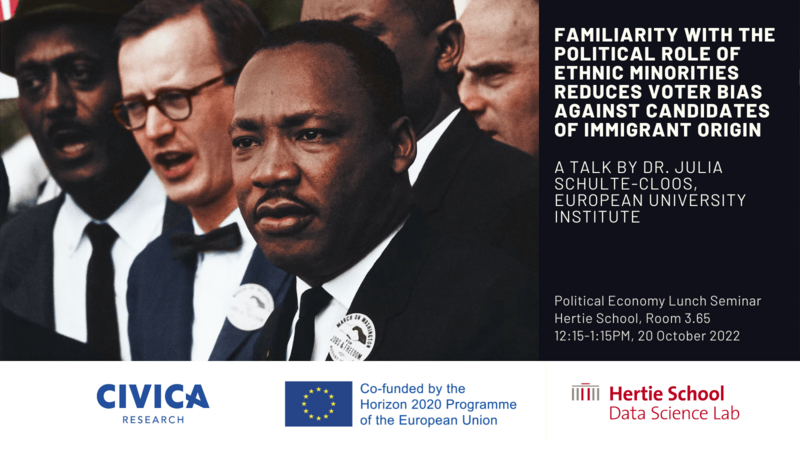
A presentation by Dr. Julia Schulte-Cloos (Research Fellow at the Robert Schuman Centre for Advanced Studies at the European University Institute). This presentation is part of the CIVICA Research Excellence Tours funded by Horizon 2020 and the Political Economy Lunch Seminar.
Why do voters discriminate against ethnic minority candidates? Existing research highlights voters' racist and anti-immigrant attitudes as the primary driver of their bias at the ballot box. However, we still lack an understanding of what drives this bias beyond overt xenophobia, which is generally seen as declining in Western societies.
In this article, I integrate theories of statistical discrimination with accounts of multiple social categorisation to argue that voters' familiarity with the political role of ethnic minorities can help reduce their electoral biases. Voters' reluctance to support minority candidates is rooted in their rare exposure to minority representatives in prominent political positions and their failure to assume political competence among political aspirants of immigrant origin. To test this argument, I experimentally manipulate voters' familiarity with the political role of minority candidates by relying on an AI-based generation of synthetic candidate images that carry the facial features of well-known minority politicians. Embedding these synthetic images in a visual conjoint experiment, I demonstrate that as voters become aware of the political role that ethnic minorities can take in modern societies, they discriminate less against minority candidates and are more convinced of their political qualifications.
Photo credit: Caption reads, "[Civil Rights March on Washington, D.C. [Dr. Martin Luther King, Jr. and Mathew Ahmann in a crowd.], 8/28/1963" Original black and white negative by Rowland Scherman. Taken August 28th, 1963, Washington D.C, United States (The National Archives and Records Administration). Colorized by Jordan J. Lloyd. U.S. Information Agency. Press and Publications Service. ca. 1953-ca. 1978. catalog.archives.gov/id/542015
Speakers
Dr. Julia Schulte-Cloos, European University Institute
Dr. Schulte-Cloos is a Research Fellow at the Robert Schuman Centre for Advanced Studies at the European University Institute. Her research interests centre on comparative politics, political behaviour, computational social science and reproducibility. She is the recipient of the Rising Star Award 2021. Individual appointments with Julia possible between 14.35 to 17.00 h: Please write an email to derichs[at]hertie-school[dot]org

